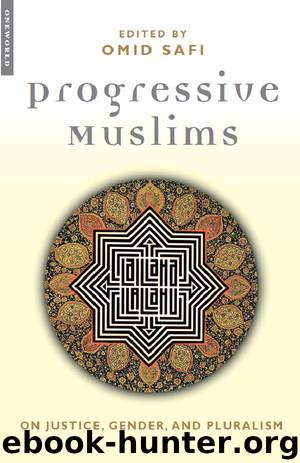Progressive Muslims by Omid Safi

Author:Omid Safi
Language: eng
Format: epub
Publisher: Oneworld Publications
Published: 2011-12-02T16:00:00+00:00
CONTEMPORARY DISCOURSES: NEO-CONSERVATIVES
The neo-conservatives are the most prominent faction in debates over the proper legal and social rights of Muslim women today.35 Their views are represented in publications subsidized by the Saudi government and organizations like the Jamaat-i Islami, and distributed as pamphlets and booklets in mosques and conferences of Muslims everywhere; they are likely to be the most influential group in mosques in the West. Though they often support adherence to Islamic law, they do not have the political zeal of the fundamentalists, nor are they seeking a return to a pristine, original law. Rather, they support the continued enforcement of law as developed by jurists through the classical period and, in its transformed form, by legislatures in Muslim nations. I have lumped together in this group both those with traditional religious education (the ‘ulama) and those non-specialists – far more numerous – whose support for Islamic law is a matter of principle, but whose understanding of the law is derived from contemporary notions. Even though there are some differences between these groups that might warrant separate consideration, I treat them together in part because in both cases the discourses with which Islamic law is explained and justified take on a decidedly non-traditional tone. Neo-conservative authors may believe in adherence to classical legal doctrines (though, as will be seen below, this is not always the case), but they justify them with language that is, more than anything else, Victorian.
This phenomenon can be seen clearly in a treatise on nushuz by Saalih ibn Ghanim al-Sadlaan, a professor from the College of Shari‘ah at Muhammad ibn Saud Islamic University in Riyadh. While the author is clearly trained in the doctrines and methods of jurisprudence, and his study draws on these sources, he adopts a tone of biological determinism that is alien to classical fiqh discourses:
The woman is naturally conditioned and created by Allah to perform the functions of pregnancy, giving birth, and taking care of the internal affairs of the house. Man, on the other hand has been endowed with more physical strength and clearer thought and he is, therefore, more befitting to be the leader of the household and the one responsible for providing the means of livelihood, protecting the family and bringing about security and continuance in the family.36
While the notions of male superiority and headship of the family, and even of men’s greater intellectual and physical capacities, are consonant with earlier jurisprudential treatments of spousal rights, the link the author draws between women’s capacity for childbearing and their duty to “tak[e] care of the internal affairs of the house” is not merely a restatement of traditional jurisprudential views. Rather, this formulation assimilates early fiqh rules about male support to a male breadwinner / female housewife model that is more in keeping with ideas about 1950s America. As the previous section has shown, this model is inaccurate to describe the early jurists’ rationale for male support of their wives. In the case of this particular work, despite the adoption
Download
This site does not store any files on its server. We only index and link to content provided by other sites. Please contact the content providers to delete copyright contents if any and email us, we'll remove relevant links or contents immediately.
| African-American Studies | Asian American Studies |
| Disabled | Ethnic Studies |
| Hispanic American Studies | LGBT |
| Minority Studies | Native American Studies |
Cecilia; Or, Memoirs of an Heiress — Volume 1 by Fanny Burney(32558)
The Great Music City by Andrea Baker(32019)
Cecilia; Or, Memoirs of an Heiress — Volume 2 by Fanny Burney(31956)
Cecilia; Or, Memoirs of an Heiress — Volume 3 by Fanny Burney(31942)
We're Going to Need More Wine by Gabrielle Union(19046)
All the Missing Girls by Megan Miranda(16028)
Pimp by Iceberg Slim(14508)
For the Love of Europe by Rick Steves(14121)
Bombshells: Glamour Girls of a Lifetime by Sullivan Steve(14075)
Talking to Strangers by Malcolm Gladwell(13370)
Norse Mythology by Gaiman Neil(13365)
Fifty Shades Freed by E L James(13241)
Mindhunter: Inside the FBI's Elite Serial Crime Unit by John E. Douglas & Mark Olshaker(9343)
Crazy Rich Asians by Kevin Kwan(9292)
The Lost Art of Listening by Michael P. Nichols(7506)
Enlightenment Now: The Case for Reason, Science, Humanism, and Progress by Steven Pinker(7313)
The Four Agreements by Don Miguel Ruiz(6765)
Bad Blood by John Carreyrou(6621)
Weapons of Math Destruction by Cathy O'Neil(6280)
